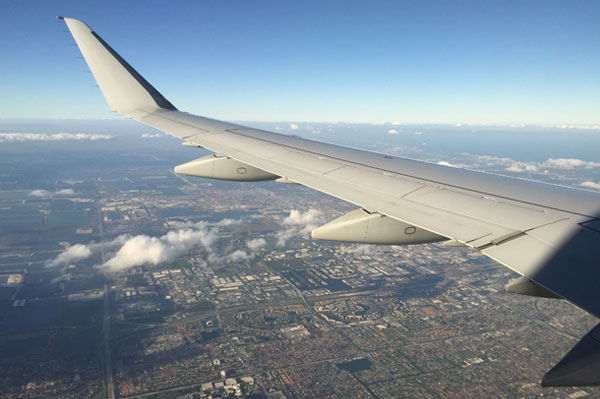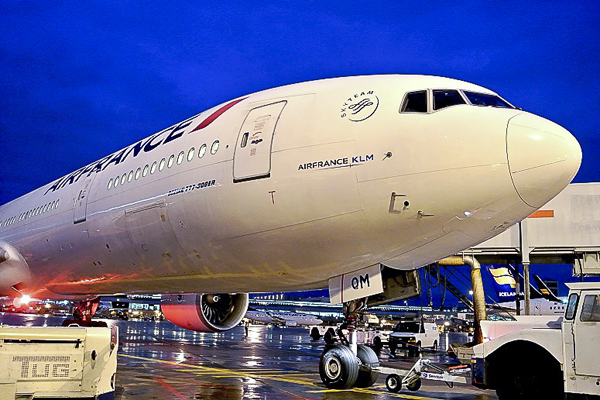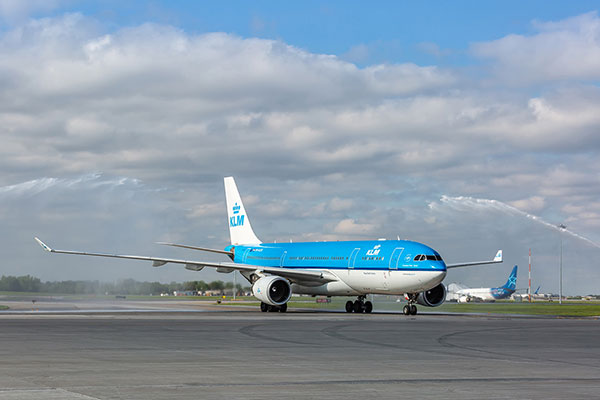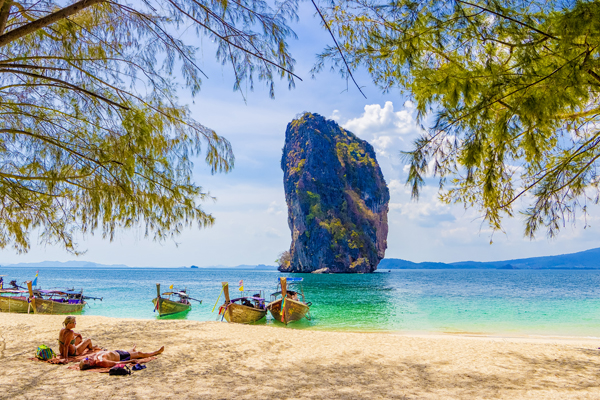Air Update: IATA, Nanaimo, Air France, KLM & More

IATA says that while it supports the wearing of face coverings for passengers and masks for crew on board aircraft “as a critical part of a layered approach to biosecurity to be implemented temporarily when people return to traveling by air, it does not support mandating social distancing measures that would leave ‘middle seats’ empty.
The global airline industry association argues that evidence suggests that the risk of transmission on board aircraft is low, pointing out that mask-wearing by passengers and crew will reduce the already low risk, while avoiding the dramatic cost increases to air travel that onboard social distancing measures would bring.
Alexandre de Juniac, IATA’s director general and CEO, said that: “The safety of passengers and crew is paramount. The aviation industry is working with governments to re-start flying when this can be done safely. Evidence suggests that the risk of transmission on board aircraft is low. And we will take measures — such as the wearing of face coverings by passengers and masks by crew — to add extra layers of protection. We must arrive at a solution that gives passengers the confidence to fly and keeps the cost of flying affordable. One without the other will have no lasting benefit.”
IATA is recommending mandatory face-coverings for passengers and masks for crew as one of several actions to reduce the already low risk of contracting COVID-19 on board aircraft.
Along with face coverings, the layers of temporary biosecurity measures being proposed include:
- Temperature screening of passengers, airport workers and travellers.
- Boarding and deplaning processes that reduce contact with other passengers or crew.
- Limiting movement within the cabin during flight.
- More frequent and deeper cabin cleaning.
- Simplified catering procedures that lower crew movement and interaction with passengers.
IATA also said that when proven and available at scale, testing for COVID-19 or immunity passports could also be included as temporary biosecurity measures.
It also said that it doesn’t recommend restricting the use of the ‘middle seat’ to create social distancing while onboard aircraft, saying that evidence, although limited, suggests that, the risk of virus transmission on board aircraft is low even without special measures.
IATA’s de Juniac observed that: “The cabin environment naturally makes transmission of viruses difficult for a variety of reasons. That helps explain why we have seen little occurrence of onboard transmission.”
He continued: “In the immediate term, our aim is to make the cabin environment even safer with effective measures so that passengers and crew can return to travel with confidence. Screening, face coverings and masks are among the many layers of measures that we are recommending. Leaving the middle seat empty, however, is not.”
Clearly, the long-term solutions for COVID-19 depend on medical science, with IATA’s boss observing: “We need a vaccine, an immunity passport or an effective COVID-19 test that can be administered at scale. Work on all of these is promising. But none will be realized before we will need to re-start the industry.”
And he continues: “That’s why we must be ready with a series measures, the combination of which will reduce the already low risk of inflight transmission. And we must be careful not to hard-wire any solution so we can be quick in adopting more efficient measures as they will undoubtedly become available.”
In terms of dollars and cents, IATA points out that calls for social distancing measures on aircraft would fundamentally shift the economics of aviation by slashing the maximum load factor to 62%, which is well below the average industry breakeven load factor of 77%.
And with fewer seats to sell, unit costs would rise sharply. Compared to 2019, air fares would need to go up dramatically — between 43% and 54% depending on the region — just to cover costs.
Said de Juniac: “Airlines are fighting for their survival. Eliminating the middle seat will raise costs. If that can be offset with higher fares, the era of affordable travel will come to an end. On the other hand, if airlines can’t recoup the costs in higher fares, airlines will go bust. Neither is a good option when the world will need strong connectivity to help kick-start the recovery from COVID-19’s economic devastation.”
Go to www.iata.org .
Nanaimo Airport Picks New Boss
Nanaimo Airport has named Dave Devana as its new CEO, describing him as “an innovator with a focus on environmental stewardship and economic development.”
Devana succeeds Mike Hooper, who is retiring.

For more than 20 years Devana led organizations as a chief administrative officer and chief financial officer in local government. He’s also a resident of north Nanaimo, where he lives with his wife.
Wendy Clifford, chair of the Nanaimo Airport Commission, said: “Dave is a motivational leader with a wealth of senior management experience. His background makes him uniquely suited to fulfill our vision of being ‘Your Island Gateway to the World’.”
As for Devana, he said: “I am looking forward to working with the Board and the staff to provide a safe, efficient and expanded airport service to our customers.”
And he continued: “I also see a great opportunity to apply my skills to partner with local governments, First Nations, non-governmental organizations and business to expand the economic impact of the airport. I am eager to get started working with our partners to enhance our communities.”
For more, go to www.nanaimoairport.com

Air France, KLM Make Masks Mandatory
Beginning May 11, both Air France and KLM will make the wearing of masks compulsory on all of their flights.
Air France said that in line with French instructions making the wearing of a mask compulsory on public transport, it will ask its customers to wear a mask throughout their journey as of May 11, 2020.
The airline will notify customers of the policy via all communication channels (e-mail, sms, websites) prior to their departure and will be asked to ensure they possess one or more masks for their trip.

As for KLM, the carrier said that starting May 11 and simultaneous with the restoration of the KLM network, masks will be compulsory on board and during boarding.
The carrier advised that passengers are responsible for providing their own face masks and noted that in view of the changing nature of regulations and legislation, until further notice, face masks will remain compulsory until Aug. 31, 2020.
Further details will be published in the course of this week on KLM.com and in passengers’ pre-travel and check-in information.
Since the Covid-19 outbreak began, KLM has introduced many measures around screening and hygiene to protect customers and KLM staff, on board and at airports. KLM’s policy is based on national (RIVM) and international (WHO, IATA) guidelines, and complies with international law and regulations. In situations where social distancing cannot be guaranteed, the wearing of face masks will be recommended or made compulsory. Some destinations already require face masks to be worn on board flights.
As well, KLM has announced that it will gradually begin restoring its European network. The airline will resume daily service to seven extra destinations, which were suspended in compliance with Covid-19-related travel restrictions.
KLM’s dramatically reduced European network is configured to connect with as many flights as possible in the intercontinental network. Routes will gradually be reopened, but may change weekly, depending on measures being taken by the authorities at the destinations.
The carrier said its target for May is the resumption of 15% of its flights, compared to the period before the Covid-19 outbreak. A considerable number of the intercontinental flights are currently being operated on a cargo-only basis, however as of this week, it resumed service to Bacelona, Madrid, Rome, Milan, Budapest, Prague, Warsaw and Helsinki

Thai Extends Mileage Validity
Thai Airways International says that due to the COVID-19 outbreak, it is extending mileage validity for Royal Orchid Plus (ROP) members who have mileage expiration at the end of March, June and September 2020 respectively, in order to accommodate valued customers.
Alisara Kidmai, Director, Royal Orchid Plus, Thai Airways International Public Company Limited (THAI), said that as passengers may find it necessary to postpone travel plans as a result of the ongoing COVID-19 outbreak and may redeem less awards, THAI will extend validity of miles which expired or will expire at the end of March, June, and September 2020 to be eligible for award redemption until Dec. 31,2020.
In addition to redeeming award tickets, ROP members may also redeem lifestyle awards via thaiairways.com/rop website by using their membership number and PIN code to log into their THAI ROP membership account for award redemption of preferred choice.


